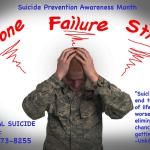
Picking up on our main post today about how Canada is considering extending the law that legalizes assisted suicide for people who are depressed. And how suicide prevention counselors work to persuade the suicidal that their lives do have value, even if they are suffering. . . .
Depression can indeed be a mental illness. It can even be due to a physical illness. It can also be a perfectly rational and appropriate response to bad things happening in one’s life. If you lost your job and were abandoned by someone you love, of course you are going to be depressed. It can also be a matter of mood or personality. Or sometimes we feel a wave of melancholy that we cannot explain but is just a part of our lives. Spiritual giants are often put through what has been called a “dark night of the soul.” The father of the Lutheran Church Missouri Synod, C. F. W. Walther, was plagued by spells of debilitating depression. So was Martin Luther, who described his depressions with the untranslatable German word Anfechtungen, meaning trials, struggles, despair, testing.
In a brief essay on Luther’s Anfechtungen, Pastor Richard Bucher says this:
After his evangelical breakthrough, Luther understood the positive contribution that his Anfechtungen made to his theology (his understanding of the Gospel). In one of his “Table Talks” Luther once remarked, “I didn’t learn my theology all at once. I had to ponder over it ever more deeply, and my spiritual trials [anfechtungen] were of help to me in this, for one doesn’t learn anything without practice” (LW 54:50). Later, in discussing what makes a true theologian, Luther, following Psalm 119, lists tentatio (spiritual trials, including anfechtungen) as one of the three rules, and calls it the “touchstone” of theology. (LW 34:279-288).
All of this is a buildup to my discussion topic for this weekend. Nathanael Blake wrote an essay for The Federalist entitled Celebrities’ ‘Misery Chic’ Aesthetic Flows From Their Spiritual Poverty on the dark and depressing themes of much of our popular music, books, and movies today. He relates that to their bleak and hopeless worldview. He quotes a tweet by Rev. Hans Fiene, of Lutheran Satire:
“A lot of people who have depression don’t really have mental illness. They’re having the appropriate response to leading a life that’s antithetical to happiness. So antithetical, in fact, that they’d be mentally ill if they were happy. If you live a life of solitude, existing only to work for someone who doesn’t care about you, no spouse, no children, no exercise, porn addiction, weed-cope, hostility or apathy towards your God, you need to see a doctor if you feel like you’re crushing it.”
Discuss.
None of these cases, of course, is reason to kill yourself or to go to Canada to get a doctor to do it for you. The depressed need help, support, solutions to their problems, medication, and faith.














